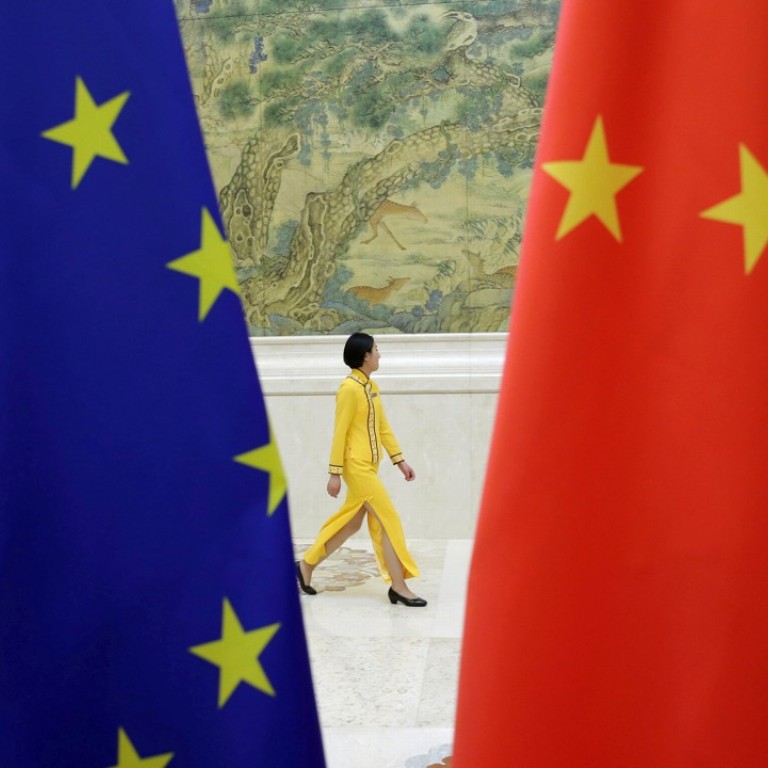During a meeting on the sidelines of the G20 summit in Argentina last Saturday, Chinese President
Xi Jinping and his US counterpart
Donald Trump agreed to a truce in the trade war escalation between their two countries. The chances for a comprehensive agreement with the United States were remote, and China’s charm offensive to
rally support in Europe in the lead-up to the multilateral gathering in Buenos Aires was a sign of its desire to hedge against Trump’s anti-free-trade instincts.
In his
keynote speech at the “China meets Europe” summit in Hamburg, Germany, last week, Chinese Vice-Premier
Liu He emphasised that his country and the European Union were “staunch supporters” of free trade and multilateralism, and shared “enormous common interests”. Liu also called for the strategic partnership between the two parties to take on “even greater global significance”.
Speaking at a business forum in the Netherlands in October, Chinese Premier
Li Keqiang was even more direct. He said that in light of the “growing uncertainties and destabilising factors” in the world economy – evidently a euphemism for Trump’s trade policies – two major economies such as China and the EU should step up strategic communication and coordination, and “respond to the challenges together”.
However, the EU and its member states are unlikely to go all the way against their long-standing Atlantic ally and form a united front with China against Trump’s trade war, should Washington and Beijing not seal a final deal within the next 90 days.
The US protectionist drive has actually angered the EU bloc, which has been
quick to retaliate against Trump’s import duties on metals – a response that has infuriated the US president. But it is likewise true that the Europeans share Washington’s accusations of
unfair trade and investment practices against China. What’s more, they have taken steps to confront Beijing’s market-distorting actions.
On November 20, the European grouping cleared a provisional plan to set up a screening mechanism for Europe-bound foreign direct investment. EU leaders denied that such a vetting system intended to block China’s purchase of strategic European assets, but it’s beyond question that core EU nations such as Germany and France have promoted the new legislation in reaction to the growing focus of Chinese state-owned and state-financed enterprises on their security-sensitive industries.
The EU
wants a level playing field for its investors. The bloc laments that European companies cannot invest in the world’s second-largest economy, like the Chinese can in Europe. Indeed, European businesses that intend to operate in China must establish joint ventures with local counterparts and often transfer technology to them. Chinese firms have no such restrictions in the old continent.
Furthermore, China and Europe have conflicting investment strategies in Eurasia. The European Commission (the EU executive body) set out a
plan to enhance connections between Europe and Asia last September. This is widely viewed as an alternative to Xi’s
Belt and Road Initiative for better Eurasian connectivity, at least in the sense that it is aimed at fostering market-based infrastructure development in the vast region rather than state-led.
The EU is indeed sceptical of China’s opaque business model for the Belt and Road Initiative. Through its “Asia-Europe connectivity scheme”, the EU wants to advance commonly agreed cross-border standards and rules to ensure a fair competition environment for all investors, with the guarantee that investments in Eurasian infrastructure are financially, fiscally, socially and environmentally sustainable.
On November 22, the EU Commissioner for Trade Cecilia Malmström
presented a proposal for the creation of a multilateral court to settle all investor-state disputes. In contrast, Beijing is working to set up its own tribunals to handle trade and investment conflicts that arise from the belt and road project. In January, the Central Leading Group for Comprehensively Deepening Reforms, a political body chaired by President Xi, approved guidelines on the creation of belt and road courts in China, pointing out that they should be based on existing Chinese mediation, arbitration and judicial institutions.
Emanuele Scimia is an independent journalist and foreign affairs analyst
This article appeared in the South China Morning Post print edition as: China and EU unlikely to unite against Trump


